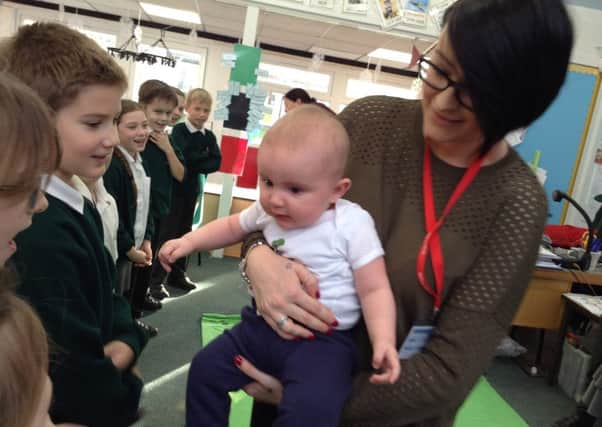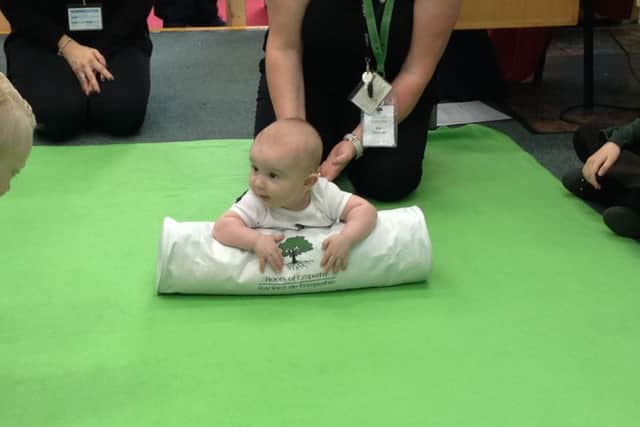How Tiny Teachers are reducing aggression in Doncaster classrooms


Babies have been visiting primary schools in Doncaster since September as part of the charity Action for Children’s Roots of Empathy scheme, a first for the region.
Along with their parents, the babies are used to help pupils understand their own feelings and those of others by interacting in a nurturing manner. New research shows the scheme can reduce bullying and aggression in children by 76 per cent, with a significant impact amongst pupils who display higher levels of aggressive behaviour.
Advertisement
Hide AdAdvertisement
Hide AdMore than 20 babies are now ‘tiny teachers’ in ten Doncaster schools, after funding was provided by the NHS innovation fund and Doncaster Council.


Mary Gordon founded Roots of Empathy in Ontario, Canada, in 1996. It has since been used around the world, including in New Zealand and Scotland. While some cultural differences mean minor changes to the programme, the principles are unanimous across different countries, she said.
“By watching the baby, and reading their emotional cues, children are able to better understand their own behaviours,” she told the Yorkshire Post.
“There is no other programme in the world like this, and it makes no difference if you’re in downtown Toronto or downtown Doncaster - the principles of how you understand relationships and empathy are the same.”
Advertisement
Hide AdAdvertisement
Hide AdShe said Doncaster Council had been “future-focused” in supporting Roots of Empathy.
“They are pragmatic, they know what the problems are, and they have not been asleep at the wheel in dealing with them,” she added.
The new study, carried out by QA Research and Glasgow University, examined the extent to which the programme changes aggression and empathy in children aged between five and eight years-old. Overall, results suggest that the group of pupils who tend to benefit the most from Roots of Empathy interventions are those who are low in empathy, low in pro-social behaviour and high in aggression.
The programme helps the children in classrooms understand that for brains to develop, they need to be cared for with attention and love.
Advertisement
Hide AdAdvertisement
Hide AdJohn Egan, director of children’s services at Action for Children, said: “Roots of Empathy aims to close the attainment gap for pupils, particularly those in deprived communities. There is also evidence in the report that it is children that need it most that get the most benefit from Roots of Empathy.
“We welcome the findings of this new research that shows that the innovative programme continues to make a significant impact on the life chances of children across the North of England and beyond, at what is a very important age.”
Schools including Tollbar Primary, Kirkby Avenue Primary, Intake Primary, Mexbrough HighWoods Primary, Thorne Green Top Primary, Kirk Sandalls Infants, Kingfisher Primary, Plover Primary, Mallard Primary and Bawtry Mayflower Primary will run the programmes until June 2016.
Janet Foster, headteacher at Kirk Sandall Infants, Doncaster, said the school was “absolutely delighted” with the impact the project was having in its two reception classes.
Advertisement
Hide AdAdvertisement
Hide AdShe said: “The children, who are aged four and five years, are engaging really well and we already have positive evidence of the development of their understanding of emotions and feelings.
“The instructors, mums and ‘tiny teachers’ are fantastic and are thrilled to have the opportunity to be part of this project which has such a secure research base.”
Volunteer Cathy Parkin joined the project with her baby Millie.
She said: “The roots of empathy course has been a lovely experience so far. The development of empathy is an incredibly important part of learning for all children which makes this course so valuable. It’s obvious the children adore my daughter Millie and she gains do much from seeing the children too.
“All the children are obviously learning and gaining so much from the programme, evidenced by their comments in session and their behaviour towards Millie. It’s been really rewarding already.”